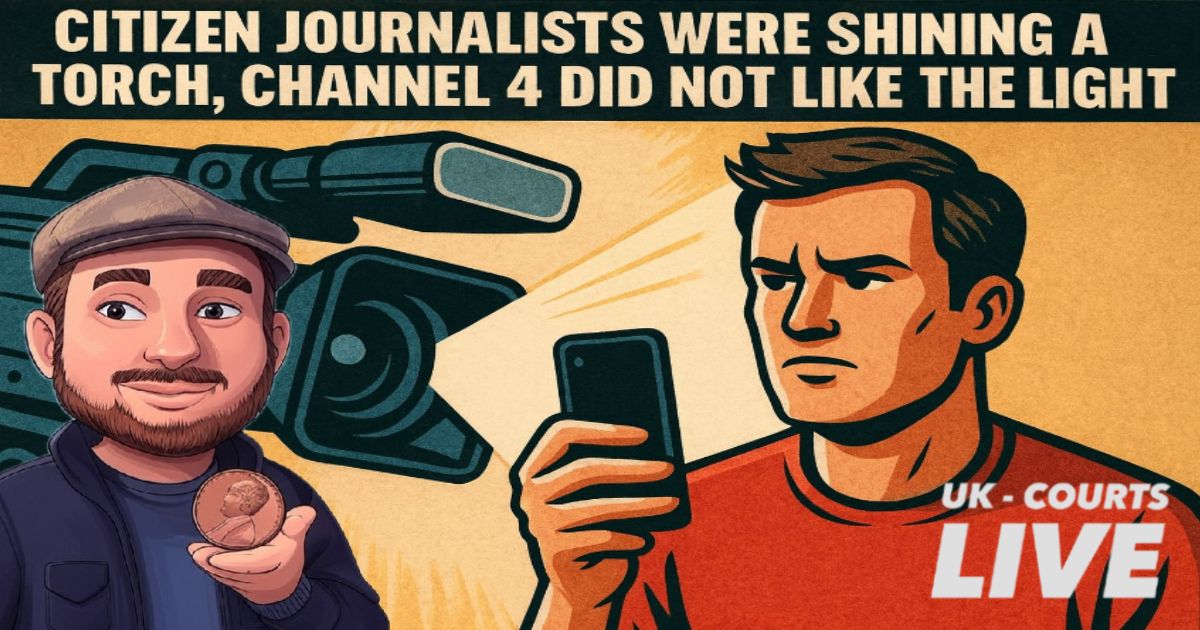🔴 Citizen Journalists Were Shining a Torch, Channel 4 Did Not Like the Light!
Citizen Journalists Were Shining a Torch. But Channel 4 Did Not Like the Light.
Viewers are tired of being lectured by a media class that shows up late, edits out the awkward bits and narrates the rest with a raised eyebrow. Into that vacuum stepped citizen journalists, ordinary people with a phone, a backbone and an insistence on letting the camera run. They were not perfect, they were not trained, but they were there and lately some in legacy media seem more offended by that fact than by the stories those cameras reveal.
Channel 4 News’s investigation into migrant hotel auditors proved the point. It was billed as a public service exposé. In reality, it looked and felt like a hit piece on citizen reporting itself. Their framing turned a loose collection of livestreamers and independent videographers into a sinister industry, a monetised outrage machine, a conveyor belt for extremism. The villain of the hour was a citizen journalist known as AY Audits, named by Channel 4 as Anthony Barnes, who had filmed disruptive protests and policing operations around hotels housing asylum seekers.
Here’s what Channel 4 got wrong.
First, it reduced an entire movement of people filming what was happening, often because mainstream crews weren’t there, into a cartoon of monetised rage. The report suggested that if you earned money from covering public events you must be trading in hate. That logic would shutter half the media industry by teatime. The message was clear, we are journalists, you are agitators with iPhones.
Second, the coverage blurred the vital line between lawful filming and unacceptable behaviour. Filming police operations, council actions, protests and counter-protests from public spaces is legal and healthy in a democracy. Trespass, harassment and intimidation are not. Instead of drawing that bright line and admitting most citizen footage simply showed what happened, Channel 4 bundled it all together to imply the camera was the problem. That was nonsense, and they knew it.
Third, the report feigned shock that citizen journalists had audiences and that platforms monetised popular content. That is the same business model every broadcaster uses. Viewers choose what to watch, advertisers choose what to sponsor, platforms enforce their own often inconsistent rules. If you want better enforcement, fine, but don’t pretend only outsiders are sullied by the economics of attention while big broadcasters float above it all. Channel 4 even promoted this segment with the tagline “Inside the lucrative industry,” as if the very fact of income made the content invalid. It did not.
Citizen journalism exploded because people were not stupid. They see stories, especially about immigration, public order and government competence, massaged into narratives that bore little resemblance to reality. They see events mischaracterised, quotes clipped, footage selectively edited. And they realise that 30-minute-plus livestreams, shaky as they are, tell them more than a polished two-minute package. That is why millions watch.
Yes, there’s a darker online ecosystem. Grifters, racists, and clout-chasers. There always had been. That is not a citizen journalism problem, that is a people problem. The solution is simple, proper policing of actual offences, clear platform rules and better journalism from mainstream outlets. Give people full, rigorous reporting and they won’t need a bloke with a battery pack to find out what happened.
Look at what Channel 4 chose to emphasise. They counted views with alarm, quoted consultants to estimate incomes and sprinkled in think tank soundbites to suggest causation the footage itself didn’t prove. The Institute for Strategic Dialogue does track anti-migrant language spikes, but its work acknowledges a complex, multi-platform environment driven by policy decisions, policing and real-world events. Turning that into a morality play about livestreamers was lazy.
Context matters. Sensitive public order incidents move from pavement to platform to national bulletin at breakneck speed. When video exists, it shapes the narrative. Sometimes that video is captured by an independent camera, not a network crew, and thank goodness it is. Without citizen footage from protests, hotel stand-offs or council confrontations, many communities would have no contemporaneous record at all, just a retrospective voiceover telling them what to think later. ITV proved it was possible to cover these events plainly when it filed straight reports on the Bell Hotel demonstrations in Epping.
Channel 4 also leaned on guilt by association. If an extremist turned up at a public protest, everyone filming was contaminated. That is a laughable standard. By that measure, every broadcaster who ever filmed a rowdy demo should be hauled over the coals for whoever wandered into shot. The real test is simpler, did the journalist, citizen or otherwise, promote unlawful activity, direct it, or break the law?
And the advertisers? The programme paraded familiar brands as if to shame them for pre-roll ads routed by algorithm. Unless Channel 4 plans to refund every penny it made from ads next to contentious material, this attack line was theatre, cheap theatre at that. Either we accept the messy reality of programmatic ads and demand better controls across the board, or we stop pretending independents are uniquely tainted by it.
Here’s a radical idea, if mainstream news wants to shrink the audience for independent streams, beat them on the basics. Turn up, stay late, show more raw footage, publish full timelines when there’s a public interest row, stop sermonising, trust the viewer. When broadcasters do this, people respond. When they don’t, they go elsewhere.
Citizen journalists aren’t replacing professional reporting, they are forcing it to up its game. They make it harder to ignore the inconvenient, harder to under-report the unpalatable, harder to pretend nothing happened. They are, in short, shining a torch. Sometimes that light reveals ugly truths, about protesters, police, councils, even the citizen journalists themselves. Good. Sunlight disinfects and democracy can take the glare.
Condemn harassment, doxxing, trespass, and intimidation, whoever does it. Enforce the law. But spare the sneer for those who film and upload what they see. If Channel 4 wants to argue about tone, it should start with its own. Because the real story here isn’t that citizen reporters exist or that audiences watch them, it’s that too often, the institutions paid to do this job didn’t. That’s not the fault of a bloke with a camera, that’s on the people who had the cameras all along.
Support those who turn up. Watch their streams, share their footage, and demand better from the media paid to inform you.
Support the people who turn up. Watch their streams, share their footage, and hold the press to the same standard they demand of everyone else.




